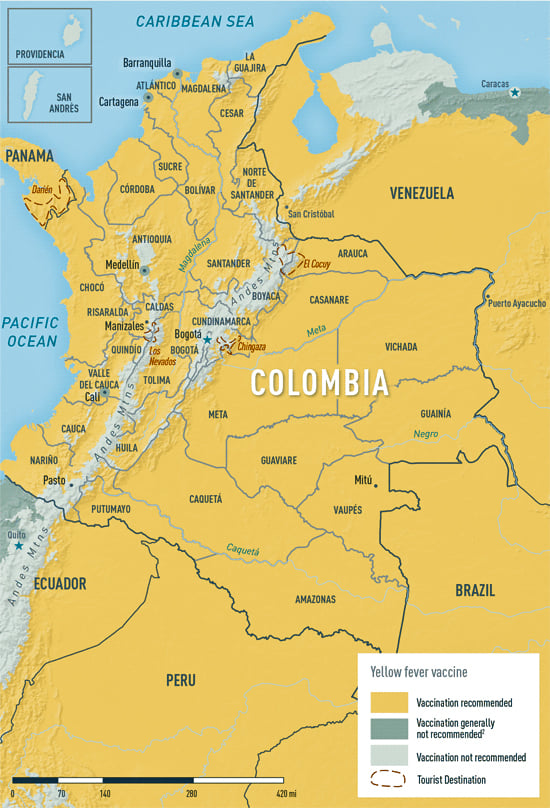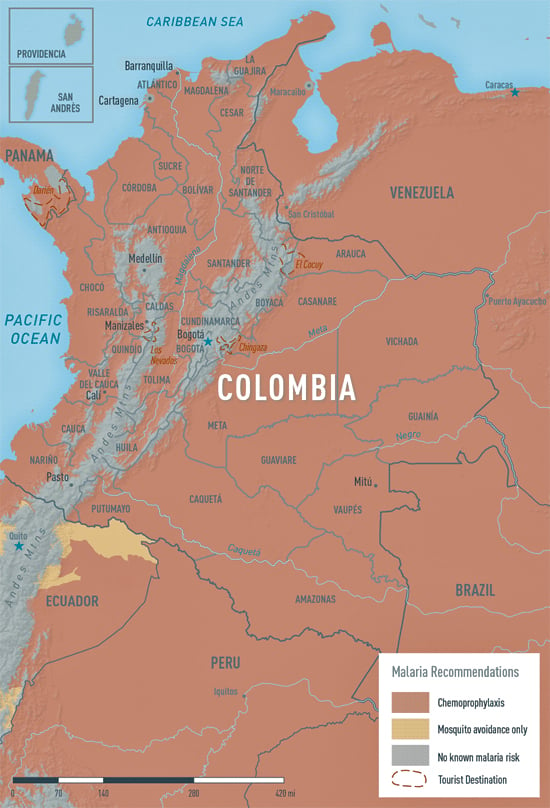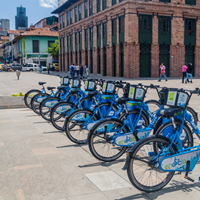Healthcare in Colombia > Colombia Healthcare & Health Insurance FAQ
FAQ about Healthcare & Health Insurance in Colombia

Frequently Asked Questions
- What vaccinations do I need for Colombia?
- Is there yellow fever in Colombia?
- Do you need malaria tablets for Colombia?
- Is there malaria in Colombia?
- What is Medicina Prepagada?
- What is Colsantias?
- Should I have a baby in Colombia or return to my home country?
- What is an IPS?
- If I have EPS insurance, can I change my IPS?
- If I have EPS Health Insurance, which doctors can I go to?
- How much does EPS Health Insurance in Colombia Cost?
- Is public health insurance mandatory in Colombia?
- Are expats eligible for public healthcare in Colombia?
- What is the difference between private health insurance and EPS insurance?
- What is SISBEN health insurance in Colombia?
- What is EPS Health Insurance in Colombia?
What vaccinations do I need for Colombia?
If you're moving to Colombia, you should get all of the recommended vaccines for Colombia. Unlike tourists who are in Colombia for a short period of time, expats risk of exposure to various illnesses is much greater due to length of stay, travel to more parts of the country and exposure to different foods. In addition to measles-mumps-rubella (MMR) vaccine, diphtheria-tetanus-pertussis vaccine, varicella (chickenpox) vaccine, polio vaccine, and your yearly flu shot. Additionally, hepatitis A, hepatitis B and typhoid. Rabies is also recommended for many groups. Depending upon where you will be living or traveling, preventative malaria medication and yellow fever vaccinations may also be recommended.
Routine Vaccinations Colombia
"Make sure you are up-to-date on routine vaccines before every trip. These vaccines include measles-mumps-rubella (MMR) vaccine, diphtheria-tetanus-pertussis vaccine, varicella (chickenpox) vaccine, polio vaccine, and your yearly flu shot," said the CDC.
Hepatitis A
"CDC recommends this vaccine because you can get hepatitis A through contaminated food or water in Colombia, regardless of where you are eating or staying," wrote the CDC.
Hepatitis B
"Consider for most travelers; recommended for those who might be exposed to blood or other body fluids, have sexual contact with the local population, or be exposed through medical treatment (e.g., for an accident)," wrote the CDC. Regardless of your lifestyle, expats cannot rule out the possibility of a medical emergency that exposes you to Hepatitis B.
Malaria in Colombia
The CDC recommends malaria for, "All areas <1,700 m (5,577 ft). None in Bogotá, Cartagena, and Medellin. (CDC map of Malaria Risk Areas in Colombia)." Information and recommendations from the CDC about medications that prevent and treat malaria.
Rabies
"Recommended for the following groups: Travelers involved in outdoor and other activities in remote areas that might bring them into direct contact with dogs, bats, and other mammals (such as adventure travelers and cavers). Those with occupational risks (such as veterinarians, wildlife professionals, researchers). Long-term travelers/expatriates visiting remote areas. Children, because they are considered at higher risk; consider lower threshold for vaccination," wrote the CDC.
Typhoid
The CDC recommends the typhoid vaccine for expats in Colombia. They wrote, "Recommended for most travelers, especially those who are staying with friends or relatives; visiting smaller cities, villages, or rural areas where exposure might occur through food or water; or prone to adventurous eating."
Yellow Fever in Colombia
There is a risk of yellow fever in Colombia. "[Yellow Fever vaccinations are] Required if arriving from Angola, Brazil, Democratic Republic of the Congo, or Uganda and ?1 year of age and for travelers who have transited >12 hours in an airport located in a country with risk of YF virus transmission. Recommended for all travelers ?9 months of age except as mentioned below. Generally not recommended for travelers to the cities of Barranquilla, Cali, Cartagena, and Medellín (CDC map of Yellow Fever Risk Areas in Colombia). Not recommended for travelers whose itineraries are limited to all areas >2,300 m (7,546 ft) in elevation, the department of San Andrès y Providencia, and the capital city of Bogotá. Note: Yellow fever vaccine availability in the United States is currently limited. Travelers may need to schedule appointments well in advance and visit a clinic some distance away. Find the nearest clinic that has vaccine."
Is there yellow fever in Colombia?
Yes, there is a risk of yellow fever in Colombia. "[Yellow Fever vaccinations are] Required if arriving from Angola, Brazil, Democratic Republic of the Congo, or Uganda and ?1 year of age and for travelers who have transited >12 hours in an airport located in a country with risk of YF virus transmission. Recommended for all travelers ?9 months of age except as mentioned below. Generally not recommended for travelers to the cities of Barranquilla, Cali, Cartagena, and Medellín (see map below). Not recommended for travelers whose itineraries are limited to all areas >2,300 m (7,546 ft) in elevation, the department of San Andrès y Providencia, and the capital city of Bogotá. Note: Yellow fever vaccine availability in the United States is currently limited. Travelers may need to schedule appointments well in advance and visit a clinic some distance away. Find the nearest clinic that has vaccine."

Do you need malaria tablets for Colombia?
If you live in the yellow-shaded regions in the CDC's Malaria Risk Map, preventative malaria medications are recommended. In the red-shaded regions, mosquito avoidance is advice. In the gray areas, which are higher-altitude regions, malaria is not a health risk. It is notable that Bogota and Medellin are not cities where malaria is a health risk.
Information and recommendations from the CDC about medications that prevent and treat malaria.
Is there malaria in Colombia?
Yes, some regions of Colombia have a risk of malaria. The CDC has provided the map below, which shows which areas of Colombia are at risk for Malaria. "All areas below 1,700 m (5,577 ft). None in Bogotá, Cartagena, and Medellin. (See Map 2-10)."
The CDC recommends preventative malaria medication for people living in the yellow-shaded areas.
Information and recommendations from the CDC about medications that prevent and treat malaria.

What is Medicina Prepagada?
Medicina prepagada is a type of prepaid private health insurance offered in Colombia. "Medicina prepagada insurance is not related to your income. I have it and there was zero discussion about my income. My medicina prepagada is through a separate company from my EPS. So when enrolling they had no way to see any information from Sura, my EPS. Prepagada costs have more to do with age and level of coverage," explained one expat.
What is Colsantias?
Colsanitas is one of two main private insurance companies in Colombia.
"Keep in mind that when you see COLsanitas -- the word COL -- in any insurance, you are now talking about something different than EPS. Col signifies traditional private coverage as we in the U.S. know it," explained one expat.
Should I have a baby in Colombia or return to my home country?
There is no right or wrong answer to this question. If you are considering giving birth in Colombia, do your research (the same research you would probably do in your home country when choosing a doctor and hospital). Look at hospitals, meet with doctors, understand health insurance coverage and consider the what if's:
- What if my baby is born very premature? Am I comfortable with the medical care available locally? Is there a NICU in my city?
- What if my baby has a serious medical issue and needs highly specialized care or surgery?
- What if I have a complicated birth? Am I comfortable with the care I would receive?
- Am I or my baby more at risk of medical emergency or life-long issues if I stay in Colombia to have my baby?
"Our son was in the NICU for a month. The staff was great, but it's not like a NICU in the States - there are no armchairs, and you can't just hold the baby whenever you want. I didn't get to hold my son until he was 8-days-old. They don't allow wheelchairs in, so if you can't walk, you can't go see the baby (I couldn't walk until day three). Everyone has to leave when they are checking in a new baby or if they are doing procedures, so it's really unpredictable whether you'll actually get to spend time with the baby. Some days we were there for four or five hours but only got to see the baby for 30 minutes or so. If you have a high-risk pregnancy, I would recomment returning to the States. The NICU staff at FSF are great, but if our son had been born much earlier, he would have needed to medevac to the States, where the equipment and medical technology are better. They were fine for his condition, but the NICU chief told us that if the babies are smaller than two pounds, it's more difficult for them, whereas in the States one-pound babies often do just fine," advised the mom who had a baby in Bogota, Colombia
What is an IPS?
IPS stands for Instituciones Prestadoras de Servicios de Salud, which means health center. When you join an EPS in Colombia, they will assign you to an IPS. Expats advise newcomers interested in obtaining EPS health insurance to look at the IPS or health centers in the various EPS providers networks in order to narrow down the options and choose the right EPS provider for you and your family.
Some expats have successfully changed from one IPS to another. It may be different from one insurance company to another. One person wrote, "While I did not visit 'Central' (the assigned IPS), I was told it is housed in a large former house. Instead, I visited the IPS at Las Molinos in Belen - nice place, air conditioned. You make an appointment online, go to a machine and enter your cedula and it spits out a ticket. You take that to the counter and they give you your consultation room and name that is displayed on screens throughout the waiting room. When your name comes up you go and see the doctor. I went online and changed my IPS from central to Los Molinos and it takes effect the first business day of the next month."
If I have EPS insurance, can I change my IPS?
While this may vary from insurer to insurer, one expat explained how he switched his IPS, "While I did not visit 'Central' (the assigned IPS), I was told it is housed in a large former house. Instead, I visited the IPS at Las Molinos in Belen - nice place, air conditioned. You make an appointment online, go to a machine and enter your cedula and it spits out a ticket. You take that to the counter and they give you your consultation room and name that is displayed on screens throughout the waiting room. When your name comes up you go and see the doctor. I went online and changed my IPS from central to Los Molinos and it takes effect the first business day of the next month."
If I have EPS Health Insurance, which doctors can I go to?
Expats with EPS explained that your EPS provider assigns you to an IPS, which stands for Instituciones Prestadoras de Servicios de Salud. An Instituciones Prestadoras de Servicios de Salud is a health center. "Please look around in the city you decide to settle, with the EPS system, you will need to go to their doctors and if they (insurance) have few offices, you will have issues. Plus, once you get hooked with one company, it is all most impossible to change to another company," warned one expat in Colombia.
One expat explained how he switched his IPS, "While I did not visit 'Central' (the assigned IPS), I was told it is housed in a large former house. Instead, I visited the IPS at Las Molinos in Belen - nice place, air conditioned. You make an appointment online, go to a machine and enter your cedula and it spits out a ticket. You take that to the counter and they give you your consultation room and name that is displayed on screens throughout the waiting room. When your name comes up you go and see the doctor. I went online and changed my IPS from central to Los Molinos and it takes effect the first business day of the next month."
How much does EPS Health Insurance in Colombia Cost?
It is generally stated that EPS health insurance in Colombia costs 12.5% of one's income. However, that does not provide enough information for most people moving to Colombia. Many are told that the 12.5% is actually based upon the minimum wage (for eligibility in EPS vs. SISBEN). And, as one expat explained, "Minimum wage for 2019 is 828,116 and 12.5% of that is 103,514 pesos."
One expat said, "If you are a pensionado the cost of the EPS monthly is based on either 12.5% of the minimum wage, or, 12.5% of the dollar amount you used to qualify for your Pensionado Vida."
In a lengthy discussion about the cost of living in Colombia, expats share the cost of their EPS health insurance. One expat said, "Health insurance 120,000 covers both of us. Sanitas EPS, top rated company in Colombia." Another wrote that insurance for one person, "EPS health insurance [costs] 97,700."
"I use Nueva EPS for my medical care here in Envigado. I pay 115,000 COP per month. I can, and sometimes do, skip it and just use private doctors. The wait for an appt can be hours in a non-air conditioned room. And then they can just tell you to come back next month and try again. Privately I had laser surgery on one if my eyes last year and it cost 180,000 for the use of the clinic and 200,000 for the Ophthalmologist," advised one expat.
Another discussion entitled, "What are you guys paying for EPS offers additional insight into this topic.
Is public health insurance mandatory in Colombia?
This question sometimes creates confusion. Public health coverage, either through an EPS or SISBEN, is mandatory for all residents of Colombia.
The reason that the question creates confusion is because people sometimes answer this question by saying that EPS health insurance is not mandatory. The reason why they answer that way is because lower income and homeless residents are not required to enroll in an EPS since qualify for coverage through SISBEN.
For most expats who become residents of Colombia, enrolling in an ESP health insurance plan is effectively mandatory (because they do not qualify for SISBEN).
Are expats eligible for public healthcare in Colombia?
Yes, anyone with temporary or permanent residency in Colombia must enroll in either an ESP health insurance plan or SISBEN.
EPS, which stands for "Entidad Promotora de Salud," is one type of government sponsored health insurance available in Colombia. Even if you choose to purchase private expat health insurance, you must be enrolled in an EPS (unless you qualify for SISBEN, which is for lower income and homeless residents). The cost of EPS health insurance is extremely low and many expats use their IPS (health center assigned by your EPS) for basic care and go to private doctors using private health insurance for other issues and chronic conditions. "EPS is the [primary] Public Health system in Colombia and mandatory for all residents. It's not about being eligible, by law you have to have it. The cost is not based on age but rather on your income," said one expat.
What is the difference between private health insurance and EPS insurance?
"They have basic and private insurance, I think I am under EPS but I don't bother with it. I pay cash, and I am fortunate enough I can get medical care in US or UK as I wouldn't go to Colombian doctor for anything serious," remarked one expat in a discussion about the cost of living in Colombia.
What is SISBEN health insurance in Colombia?
SISBEN, which stands for "Sistema de Selección de Beneficiarios Para Programas Sociales," is a type of insurance for lower income and homeless Colombians.
What is EPS Health Insurance in Colombia?
EPS, which stands for "Entidad Promotora de Salud," is one type of government sponsored health insurance available in Colombia. Even if you choose to purchase private expat health insurance, you must be enrolled in an EPS (unless you qualify for SISBEN, which is for lower income and homeless residents). The cost of EPS health insurance is extremely low and many expats use their IPS (health center assigned by your EPS) for basic care and go to private doctors using private health insurance for other issues and chronic conditions. "EPS is the [primary] Public Health system in Colombia and mandatory for all residents. It's not about being eligible, by law you have to have it. The cost is not based on age but rather on your income," said one expat.
"Anyone interested in living in Colombia, get your cedula and immediately sign up for Sanitas EPS and worry about the details later on. You can leave the country, not pay, and you will STILL by a member years later (happened to me) And you do NOT pay for years missed, just the months of your last year here)," commented one expat.

Take the stress out of immigrating to Colombia by working with an experienced, bilingual immigration attorney.
Learn More
 Colombian Visa Services
Colombian Visa ServicesTake the stress out of immigrating to Colombia by working with an experienced, bilingual immigration attorney.
Learn More
 Healthcare in Colombia
Healthcare in Colombia
Our guide to healthcare in Colombia covers public and private healthcare in Colombia, hospitals, vaccinations, prescription medications and more.
Expats living in Colombia talk about their own experiences with healthcare, hospital visits, emergencies, finding a doctor, buying health insurance in Colombia and more.
 Top Hospitals in Colombia by Specialty
Top Hospitals in Colombia by Specialty
If you're moving to Colombia or recently arrived, it's important to know about the country's top hospitals for specific medical conditions. Here's a primer.
 Understanding Mental Health in Colombia
Understanding Mental Health in Colombia
Expats face a lot of stressors living abroad. It's important to know how mental healthcare services work in Colombia should you need them.
Answers to some of the most commonly asked questions about healthcare and health insurance for expats in Colombia.
 Healthcare in Bucaramanga, Colombia
Healthcare in Bucaramanga, Colombia
An expat talks about health insurance, hospitals and the cost of medical care in Bucaramanga, Colombia.
 Healthcare in Medellin, Colombia
Healthcare in Medellin, Colombia
An expat discusses healthcare and health insurance in Medellin, Colombia. There are several private hospitals in Medellin. He advises expats to purchase health insurance.
 Healthcare in Colombia
Healthcare in Colombia
Pay the higher insurance premium to insure quicker access to specialists. Have at least a working knowledge of the language as most doctors speak no English.
Help others moving to Colombia by answering a set of questions about health insurance, public healthcare in Colombia, prescription medicine, quality of medical care and emergency services.
Read recent baby reports submitted for Cali and Villavicencio.
If you're an expat parent who had a baby abroad, write a report about your childbirth experiences to help other expecting expat parents.



